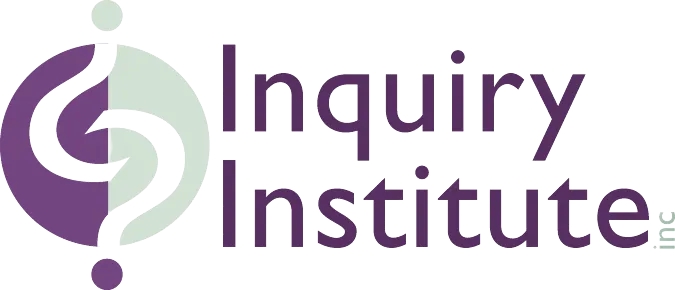Blog

The Spirit and Discipline of Organizational Inquiry
Asking Questions for Organizational Breakthrough and Transformation
When leaders, managers, and organizations recognize the true power of inquiry and take advantage of question-centered methodologies, they set a dynamic course for organizational excellence and competitive advantage. However, many are not fully aware of the impact of questioning and therefore are not motivated to take advantage of this vital strategy. It’s as if questions are so ubiquitous and so much·a part of our conversational landscape that we hardly notice them. Even leaders and managers who do recognize the impact of questions often consider them mainly as means to answers, rather than appreciating the potential of questioning for catalyzing breakthrough and transformation.
“Organizational inquiry” is a term coined to focus attention on the importance of asking questions for optimizing organizational breakthrough and transformation. By the “spirit” of organizational inquiry, I mean the willingness and courage to practice “not knowing,” which is the key to breakthrough thinking. By “discipline,” I mean the practice of questioning assumptions about structures, strategies, and business processes that shape an organization’s culture and operations. Much research into organizational effectiveness and learning is already available; for example, in the literature about learning organizations, action learning, and dialogue in general. See Senge (1990), Argyris (1992), Revans (1980), Weinstein (1998), and Dixon (1996). The purpose of the present article is to suggest a unifying concept focused on question-asking processes that can strengthen the power of organizational inquiry in creating competitive advantage.
While the power of inquiry has long been appreciated, the context suggested for it here is new. In the fifth century BC, Socrates established inquiry as the essential element of effective thinking and action. Perhaps one of history’s oldest tenets represents one of the most imperative “new” ideas for organizational excellence in the twenty-first century.
The Imperative of Inquiry in Organizations
In organizational and business life, asking questions is essential for opening new possibilities for virtually every goal and function: understanding emerging markets, gathering information, building key relationships, thinking objectively, learning and developing as an organization, and making unprecedented things happen. Asking questions also is fundamental for resolving breakdowns, making decisions, creating innovations, and managing organizational change. The most successful leaders and managers know they can’t get the “right” answers without asking the “right” questions

Questions predictably cause new openings for action, whereas statements and opinions rarely do. Astute leaders and managers also recognize that effective questions lead to effective action, while ineffective or neglected questions often result in detours, missed goals, and costly mistakes. Furthermore, breakthrough alterations in thinking depend on new, provocative questions. A paradigm shift can occur only when a question is asked inside a current paradigm that can be answered only from outside of it.
When leaders of an organization are unwilling to challenge conventional thinking, the company’s culture will naturally reflect its leadership, often leading to the ossification of the entire organization.
To get a sense of how vital effective question asking is for organizational and business excellence, ask yourself how much more productive a leader or manager could be in the following business functions by using a powerful methodology for asking questions:
Sales and marketing
Coaching and mentoring
Strategic planning
Research and development
Budgeting and cost containment
Customer relations
Career path counseling and succession planning
Information technology
Building relationships and networking
Running meetings, teams, and projects
Conflict resolution and ADR (Alternative Dispute Resolution)
Everyday communications
Why Isn’t Organizational Inquiry the Norm?
Since our goal is to encourage the spirit of inquiry and the discipline of strategic questioning as an organizational norm, it is useful to appreciate how many factors work against this. From an early age, most of us were discouraged from asking questions, especially challenging ones, whether at home, in school, or in religious institutions. As a consequence, many believe asking questions is rude, inconsiderate, or intrusive.
We also fear being asked questions since it might seem like being interrogated (note that one term for question is “interrogative!”). Moreover, it is common to fear not having the “right” answers, and therefore, not “looking good.” We even avoid asking for fear we won’t like the answers we get, or that we might need to change. Furthermore, we may not ask because we are not adept at how to ask. After all, how many of us have had the advantage of being trained in questioning expertise, or have had bosses or mentors who encouraged the development of such skills?
While answers are obviously important, many organizations miss critical and pivotal questions by looking only for answers. Perhaps this is because many individuals are reluctant to challenge the status quo and are uncomfortable when faced with questions, especially if they assume they need to provide the “right” answers. When leaders of an organization are unwilling to challenge conventional thinking, the company’s culture will naturally reflect its leadership, often leading to the ossification of the entire organization.
In answer-driven organizations (those more committed to avoiding risk than pioneering new solutions), curiosity, creativity, risk taking, challenging the status quo, and even the willingness to be wrong must take a back seat. The prevailing culture·of such organizations, either implicitly or explicitly, calls for rigidity, risk avoidance, protectiveness, defensiveness, and automatic routines and habits. Such organizations become “fossilized.” Without the intentional discipline of questioning the assumptions and beliefs of its culture and operations, an organization is reactive rather than proactive, surviving rather than thriving.
Inquiry As the Source of Organizational Transformation
Transforming an organization into one devoted to the discipline of organizational inquiry requires appreciating that questions are usually the most influential and creative aspect of speaking, listening, and thinking. Therefore, to be optimally effective in making inquiries of ourselves and others, we need to be able to “question our questions.” This means developing the attitudes and skills to notice, analyze, and revise our questions. It also allows for choosing the right kinds of questions and knowing how and when to ask them. It is not enough to rely on intuitive questioning abilities, which the most accomplished leaders, managers, and consultants certainly have. Rather, we need to include in our appreciation of inquiry an understanding of the practical importance of distinguishing those questions that lead to success and those that can prevent it.
Questions That Help or Hinder Success
To see the discipline of organizational inquiry to effect transformation, it is necessary to recognize that different kinds of questions produce qualitatively different results, whether we ask them of ourselves or of others. Distinguishing between these kinds of questions provides the possibility of consistently choosing those that lead to effectiveness, breakthrough, and transformation. The Choice Map (see below, click to enlarge) is useful for illustrating the differences in two classes of queries – “Learner” and “Judger.” Of course, these terms designate mindsets, not actual people, and all human beings have both. It is often more natural to fall into operating from our judgmental mindset. Maintaining a commitment to Leamer thinking and behaving is more challenging, although it is ultimately more rewarding. Distinguishing between these mindsets provides the powerful opportunity to choose which one to operate with at any given moment.
By examining the Choice Map, it becomes clear that Leamer questions and Judger questions lead to divergent results. Questions typical of the Learner aspect of ourselves are responsive to life’s circumstances and lead to thinking objectively, creating solutions, and relating in a win-win way. Learners ask genuine questions, which are those to which they don’t already know the answers. Learner questions typically presuppose fresh possibilities, a positive future, and abundant resources.
On the other hand, questions typical of the Judger aspect of ourselves are reactive. They lead to automatic reactions, limitations, and negativity, and they focus attention on problems rather than solutions. Such questions result in win-lose relating, or operating in what may be called an “attack-or-defend” paradigm. This Judger, or judgmental, aspect of ourselves, may be focused either internally or externally. Whatever the focus, Judger thinking and speaking both result in denying responsibility and searching for blame.
A Learner mindset and a preponderance of Learner questions lead to organizational excellence. Imagine the results if Learner questions such as these were to consistently guide your individual, team, and organi zational effectiveness: “What options haven’t I (we) considered? “How can this be the best possible win-win?” “What limitations might I (we) be placing on thinking, planning, or actions?” “How else can I (we) think about this?” “Am I (Are we) being honest with myself(ourselves)?” “What’s useful about this?” “What can I (we) learn from this?” and “How can I (we) be sure we stay on track?”
Questions predictably cause new openings for action, whereas statements and opinions rarely do.
On the other hand, Judger questions produce the opposite results. A company whose culture is over ridden with Judger questions will probably become uncompetitive, sooner rather than later. Most Judger questions present some version of “Who’s to blame?” and lead to predictable, painful, and often costly stalemates – or worse.
Learner Questions As a Source of Transformation
The power of the model of Learner and Judger thinking lies in using this awareness to bring about a transformative shift from the Judger position (characterized by a “knows-it-already” mindset) into Learner possibilities. Here’s an example of how a team in a major organization did just that. “At one meeting, the project team discovered that a report had taken an unacceptably long period of time to go from one building to another. The immediate response was for members of one department to accuse the other, with the usual denials, upsets, justifications, and explanations.” In other words, these team members were caught in an attack-or-defend paradigm that could have caused a production delay, financial losses, and an erosion of their working relationships. Fortunately one member “commented on the non-productive nature of assessing blame (and) altered the discussion to one of identifying the missing structures. Team members then came up with a way in which the review could happen simultaneously rather than sequentially. Soon they instituted accountabilities to put the new structures and procedures into operation.”
That courageous team member was operating in, or “coming from,” a Learner mindset. Consequently, the implicit thinking that led to his intervention must have included questions such as: “Is this blaming useful?” “Can we bring the project in on time if we keep this up?” and “How can I turn this situation around?” Of course, he probably wasn’t aware of many, if any, such questions. This would be typical, partly because the thinking process is so swift and streamlined. However, he did take an action that was consistent with questions such as these. In fact, his behavior could even be thought of as representing an answer to these implicit queries. Thus his Leamer mindset (operationalized as Learner questions) led him to take a Leamer action that produced a transformation in a troublesome situation with his project team
The Power of Breakthrough Questions
Here’s another example of the power of Leamer thinking through the use of a strategic, unpredictable question. This one altered a prevailing paradigm in a marketing context with bottom-line consequences. Barbara, a colleague of mine, was the head of a marketing team for a large pharmaceutical company that had developed an exciting new drug. Despite the fact that the response to their drug had been disappointing, the company was still eager to capture the market share it thought this product deserved. The problem was that the competition was already in place and two similar drugs from other companies already had much greater visibility and sales. Barbara’s dilemma revolved around her budget, which was too meager to fight the other giants, and her boss, Walt, who seemed rigid and unresponsive to her plight.
Barbara was a natural Learner, and usually able to think strategically rather than emotionally. However, in this case, she was angry and frustrated by her boss’s seemingly indifferent response to her plan for boosting their product. Consequently, she fell into a Judger mindset, and found herself mired in judgmental, limiting questions such as, “How could he be so stupid and short-sighted?” and “Why did I have the bad luck to get stuck with a boss like him? “
Barbara and I met to discuss a strategy for transforming the situation. She recognized that her Judger questions were making her increasingly upset and unable to think objectively or creatively. She came up with the following Learner questions to get her back on track: “Do I have enough information about our company’s attitude about this product?” “Is my boss experiencing any pressures about this situation that I don’t know about?” and “How can I get him to be an ally, so we both can win?” Then she and I reviewed the entire project, systematically questioning her assumptions and beliefs about the product, the market, and her company. Subsequently, she requested a meeting with Walt to reappraise the situation.
If we consider organizational inquiry in the sense of “A question not asked is a door not opened,” the possibilities it promises seem limitless.
Barbara and Walt easily got back to their previous camaraderie and were even able to laugh about the constraints the company was placing on their efforts. Then Barbara reconfirmed her commitment to the success of the product and asked Walt if they could consider some things they hadn’t covered in previous meetings. Eventually, she asked him a pivotal question that catalyzed a breakthrough in the entire situation. Her provocative query was, “Has the company ever put its entire yearly budget for a product into a single quarter?”
In fact, such a bold move was completely unheard of in this industry, even for a lagging product. However, Barbara and Walt convinced the company to do just this. The six-month market penetration was unusually successful and they convinced the company that the product was worth a much larger marketing investment. A year later this product had gained significantly in market share.
Summary
Organizational inquiry represents an imperative attitude and a set of practices for creating organiza tional breakthrough, transformation, and competitive advantage. It is useful to make a distinction between Leamer and Judger mindsets, thus providing the pos sibility of consistently asking Leamer questions. This leads the way to organizational excellence, both in terms of a company’s culture and at the practical level of daily operations. If we consider organizational inquiry in the sense of “A question not asked is a door not opened,” the possibilities it promises seem limitless.

Learn More

